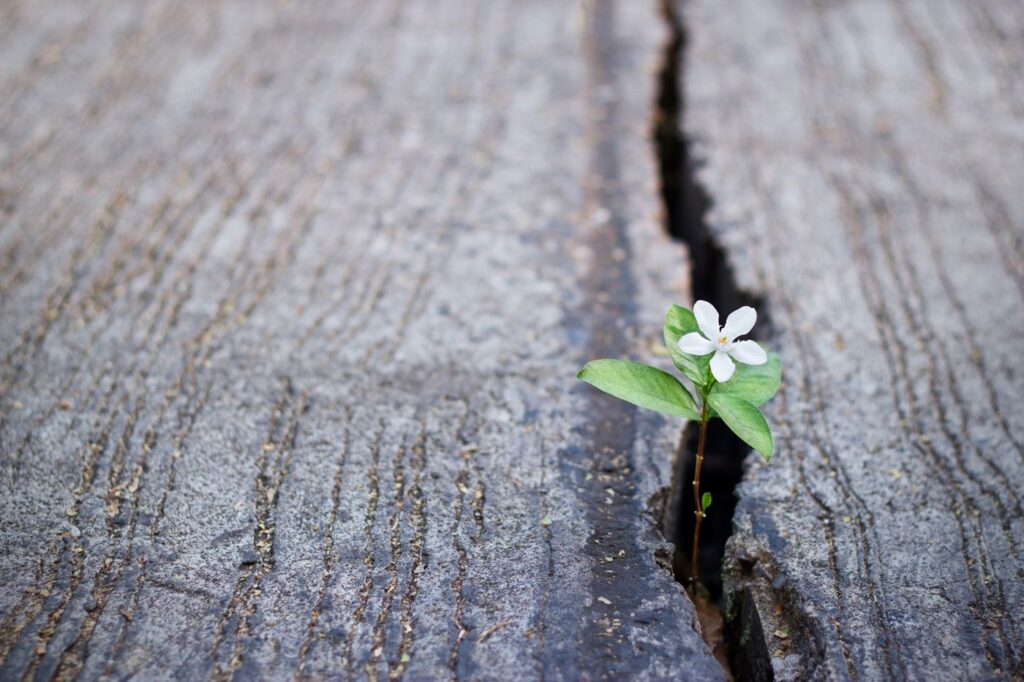As the new year begins, we’re all well aware of the many challenges facing us. Given these, it can be easy to give in to the counsels of despair. It’s also easy to turn to ideology for solutions, but it is hope—a reasonable hope, the virtue of hope—that is needed. In excerpts from his new book, Lost in the Chaos: Immanence, Despair, Hope, Editor-in-Chief R. J. Snell explores the meaning of hope as we enter 2024. Happy New Year from all of us at Public Discourse.
The antidote to despair is not perfect politics, an impossibility, a mere ideology; the cure is hope. Moral panic reveals despair at the state of things: craving the fullness of the kingdom of heaven now, but upon discovering decadence and depravity—and who can deny our time’s troubles—responding with the sadness of despair. Despair cannot be overcome with certainty or perfection, but only by hope and the truth of concrete action undertaken in the light of hope.
For the rationalist or fundamentalist character, hope cannot but seem inadequate, even silly. The world is in flames and I suggest hope—how quaint. But hope is not blind, or merely optimistic, nor is hope something we churn up in ourselves as a kind of subjective attitude. Hope is a virtue. It is a state that perfects us, makes us well, capable of thinking, living, and acting in the freedom of excellence, as flourishing human beings.
It is a common temptation to attempt to replace virtue with a hack of some sort. Immoderate in appetite? Try this diet pill. Unfriendly and impersonal? Here’s a book on how to win friends. Without hope in this world? Not a problem; here’s some program of political or social action that is guaranteed to make things well. And if that program fails, we have a backup plan. Of course, when such plans invariably fail to overcome the human condition, excuses are made—“if only we had more money,” or “if only the Founders had written differently.” Or the counsels of despair kick in, hacks are abandoned, and we conclude, “There’s nothing to be done.” As a result, we see an oscillating cycle of extravagantly optimistic plans coupled with counsels of despair and panic. Hope avoids both, knowing full well that the human condition will never be resolved through politics and, still, that we remain agents capable of acting with intelligence to improve the commonwealth.
Start your day with Public Discourse
Sign up and get our daily essays sent straight to your inbox.All the virtues are needed at all times, but hope is perhaps especially needed in our own. Politics is not first; philosophy is prior, and even that is servant to theology. Reversing the order is a drastic mistake, albeit an all-but-inevitable error for those lost in chaos. When the universe is utterly immanent, when the human is reduced, when culture is simply entertainment, it is hardly surprising that politics will occupy the center of thought and imagination. Such a politics thinks too highly of itself. Not only does a politics of ultimacy attempt to govern the entirety or totality of human affairs; it also exhibits a finality or completeness in its judgments. If there is a transcendent reality beyond human control, politics isn’t total—doesn’t include everything—for politics is simply incompetent in some domains of human life. If there is a divine authority, the judgments of politics are not final, for they are subordinate to the judgments of God. In our own moment, politics seems all-encompassing, inserting its snout into what is properly private, personal, or associational, and political judgments seem to be of considerable importance, tantamount to the demanding claims of morality.
Just now, however, politics seems to be the only game in town—everything is political!—and absolutist, dogmatic, and accompanied by an aura of hyperventilating moralism. Somewhat counter-intuitively, the more we are lost in the chaos, with the human reduced to mere matter and chemicals, and where God is dead, the more fervent and demanding politics becomes, even though reductionism lacks any capacity to ground or justify any moral or political norms. A thoroughgoing reductionism cannot in any way justify human dignity, or equality, or justice, for such things simply do not mean anything in a universe in which everything is merely matter in motion. As it turns out, the old fear that religion was a conversation-stopper and resulted in political dogmatism overlooked the more worrisome culprit: the (incoherent) dogmatism of immanentized secularism.
All the false forms of hope become forms of imprisonment and despair. They cement our isolation and forlornness. All our tools, so beneficial when kept in their proper place, promise hope without the love of God, a freedom like that of a “man who prefers his own despair to being helped out of it” and, far “from being free in the deepest sense of the term, is actually imprisoned in the cramp of an ego that has become the caricature of an imago Dei; shrunken in itself, turning ceaselessly upon itself” like a “man in prison,” as Alice von Hildebrand explains. Hope cannot function, cannot exist, without transcendence, without love allowing our self-transcendence.
All our false hopes attempt to ground themselves in hope that something will happen, that a cure will appear, that the policy will deliver, or that the plan comes to fruition. This is the hopefulness of scientism, rationalism, inner-worldliness, fundamentalism, and false enchantments. Hope cannot long survive such optimism, as evidenced by the hopelessness of our own epoch despite its many material advantages and comforts. Optimism, as described by Gabriel Marcel, is merely “camouflaged sentimentality” that quickly turns into a counsel of despair, suggesting that “wisdom is early to despair,” in the words of Gerard Manley Hopkins, since in the end “nothing can be done/ To keep at bay/ Age and age’s evils, hoar hair,/ Ruck and wrinkle, drooping, dying, death’s worst winding . . . / So be beginning, be beginning, to despair.” Marcel drives the point home: “As for death, from this objective and functional point of view it appears only as ceasing to function, falling into total uselessness, becoming sheer waste to be discarded. There is no need to stress the atmosphere of suffocating sadness secreted by a world whose main axis is functions.”
Instead, as Hildebrand and Marcel both insist, genuine hope that requires a foundation of hope in, of hope in a person. Only hope in God allows me to see, says Hildebrand, “with pitiless clarity that, humanly speaking, a situation is desperate; . . . but I rely on an extra-mundane factor, and thus refuse to see tragedy as the last word. I break through the circle of immanent causalities, and transcend to a sphere in which the pitiless unfolding of immanent laws ceases to hold sway.” When I hope in God, I not only transcend myself and my own limited power, which often can do very little, even if rushing about in wild activity in avoidance of this fact; now I hope in one beyond immanence and its severe limits and scarcities. In faith God’s love pours new life even now, granting a share of His own eternal life, and the circle of immanence is broken.
Marcel puts it as follows: “Hope consists in asserting that there is at the heart of being, beyond all data, beyond all inventories and all calculations, a mysterious principle in connivance with me, which cannot but will what I will, at least if what I will is really worth willing and is, in fact, willed with my whole being. . . . [R]eality is with me in willing that it be so. I am not just wishing, I am asserting; and this is what I . . . call the prophetic resonance of genuine hope.” To make the same point, Hopkins offers a rejoinder to the counsels of despair in the early sections of his poem, noting instead that “there is one, yes I have one . . . ;/ Only not within seeing of the sun,/ . . . Somewhere elsewhere there is ah well where! One/ . . . Yonder, yes yonder, yonder,/ Yonder.”
All that is immanent is contingent and destined for death, all is halfway between being and non-being. On this no real hope can rest, and all hopes-that flicker and fail. But in faith’s substance of things hoped for, in the hope springing from the love of God poured into our hearts, we can refuse to be enclosed; by virtue of hoping in God all our hopes that have being and fecundity. We hope in a God who created, sustained, and redeemed the world, and who is the origin and end of all, and who does not will that any should perish, who hates nothing He has created, and who came among us that there would be life abundant. We hope in a Father who pours out His goodness, who seeks to communicate His goodness as much as possible, and with Him all is possible. We hope in a God who sows even in the rocky soil, for His generosity knows no bounds, and He is infinite in wealth.
Hope is not resignation, but the condition and ground of all our actions. A friendly universe is a generative universe and requires the utmost of our attention, intelligence, reason, and responsibility. Hope does not do an end-run around our responsibility and our cooperation but allows them to be fruitful, albeit without the hint of the illusion of mastery or its tyranny, without the pretenses of rationalism, the frenzied pointlessness of denuded nature, or the idylls of faux-enchantments. Instead, hope allows us to grow into the full stature of the children of God, capable of acting, of becoming an acting person. As Thomas Aquinas knew, God’s providence determines not only what will happen but how it will happen, and God has determined that much will happen through our own freedom. All our self-constitution as agents requires our act, nor can it be otherwise. So we are set free to act, in hope, without illusion, anxiety, fear, frenzy, or despair.
Excerpted from Lost in the Chaos: Immanence, Despair, Hope. Used with permission.
Image by ipopba and licensed via Adobe Stock. Image resized.













